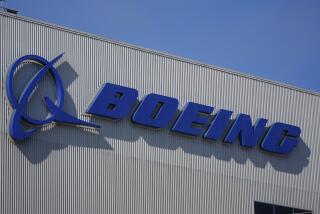Airbus Was the Better Deal, British Airways Says
TOULOUSE, France — British Airways confirmed a multibillion-dollar jet order with Europe’s Airbus Industrie, ending its exclusive reliance on Boeing Co., and said price, not politics, made the deal.
British Airways gave Airbus firm orders for 20 156-seat A320s and 39 126-seat A319s, with deliveries to start in September 1999. It took options on an additional 129 planes.
At the same time, it placed orders with Boeing for 16 of its 777 long-haul twin-jet aircraft for delivery starting in early 2000 and took options on another 16.
But British Airways said some of the new 256-seat 777s will replace five of the 15 bigger Boeing 747-400s already on order and it was canceling options on a further seven B-747s. That gives Seattle-based Boeing a net gain of about $1.5 billion in orders, compared with $2.5 billion for Airbus, not including options, estimated analyst Peter Jacobs of Seattle-based brokerage Ragen MacKenzie.
Boeing spokesman Mark Hooper described the deal as a “win-win.”
“We’re happy with what we got,” he said.
The Airbus planes will be equipped with engines made by International Aero Engines, a partnership that includes Rolls-Royce, United Technologies Corp.’s Pratt & Whitney unit and Germany’s MTU. Rolls-Royce said its share of the order could be worth more than $830 million.
British Airways Chief Executive Robert Ayling, flanked by British Prime Minister Tony Blair, Airbus head Noel Forgeard and Aerospatiale Executive Chairman Yves Michot announced the order in a huge hangar where an A320 plane was on display in BA colors.
Forgeard called the sale “a most remarkable event in Airbus history.” Blair said the British government was fully behind the Airbus consortium, a four-nation consortium of Aerospatiale of France, DASA of Germany, British Aerospace and Spain’s CASA.
But Ayling made clear that BA’s decision had been purely for cost reasons. “The Airbus-Rolls-Royce offer was a better value offer than the competitive offer. If it had not been, we would not be here,” he told journalists.
British Airways said Boeing would remain its sole supplier of long-haul aircraft. The contracts were awarded after months of tense negotiations, and analysts said the price war had been sharp.
John Leahy, a senior vice president at Airbus who heads commercial negotiations, declined to indicate what kind of discount Airbus had given from the $9-billion catalog price for the entire package of 188 planes.
While the order loss was painful to Boeing, Jacobs and other industry analysts wondered at what price Airbus won the deal, which further boosted its efforts to attain a long-term goal of a 50% share of the world market for new jets, up from less than 40% in recent years.
“Airbus has done a good job,” said Peter Aseritis of CS First Boston, referring to the British Airways deal. “The question for Airbus obviously is whether they can make money on it over time.”
Some analysts said that under Airbus’ current structure as a consortium of four manufacturers, the group does not report detailed financial figures and presumably needs merely to break even to satisfy its members.
Airbus is in the middle of a restructuring, converting from its consortium setup into a single corporate entity by 1999. The European aerospace industry is also undergoing an overhaul, with governments wanting to see a single listed firm.
Boeing’s stock slipped 31 cents to close at $35.38 on the New York Stock Exchange. British Airways’ American depositary receipts rose 56 cents to $81.94, also on the NYSE.
More to Read
Inside the business of entertainment
The Wide Shot brings you news, analysis and insights on everything from streaming wars to production — and what it all means for the future.
You may occasionally receive promotional content from the Los Angeles Times.









